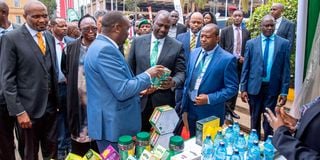Premium
Signs that Ruto will be a good President

President William Ruto flags off value-added tea to Accra, Ghana, during the AFCFTA Guided Trade Initiative at KICC, Nairobi, on October 5, 2022.
What you need to know:
- In a country where ethnicity matters politically, Dr Ruto’s moves reveal several things. They reveal his intention to unify the country after a contentious election.
- He has nominated persons into powerful posts from regions that did not vote for him overwhelmingly.
- Simultaneously, he has gone out of his way to reward the Mt Kenya region. The region has been given eight Cabinet slots in strategic ministries like Finance, Interior and Water.
Siku njema huonekana asubuhi (A good day will be known in the morning), an African proverb states.
How President William Ruto’s administration will pan out is clearly manifested by his moves so far.
The great political moves Dr Ruto has made include nominating persons into important government positions and visiting various places.
In a country where ethnicity matters politically, Dr Ruto’s moves reveal several things.
They reveal his intention to unify the country after a contentious election. For example, he visited Luo Nyanza, which largely voted for the opposition.
He has nominated persons into powerful posts from regions that did not vote for him overwhelmingly.
Simultaneously, he has gone out of his way to reward the Mt Kenya region. The region has been given eight Cabinet slots in strategic ministries like Finance, Interior and Water.
This is a greater reward than what the previous administration gave to the region despite the former President hailing from Mt Kenya.
Very few can recall when Tharaka Nithi County last produced a minister. By nominating Prof Kithure Kindiki, Dr Ruto has rewritten history by rewarding a county that gave him 87 per cent of its vote despite dropping its son from the Deputy President slot.
Foment trouble
This is a very wise move. Niccolo Machiavelli, in his book The Prince, advised a king who conquers a foreign territory to move his political base into the new territory. Leaving such a territory unattended can foment trouble.
The book, written in the1550s, advised that new principalities always cause problems for the prince.
People are willing to change rulers to better their own lot, but they soon discover that things have got worse, because a new ruler must harm those he conquers.
Then you have as enemies those you harmed while seizing power, as well as those who put you in power, because you can never satisfy all their ambitions.
If conquered territories annexed to yours are similar in location and customs, it is easy to keep them, especially if they were hereditary principalities not used to independence.
As long as you do not change their way of life, you need only wipe out the old ruling family to keep them. But if new territories are different in language and customs, they are difficult to keep.
The best methods are to go and live there yourself… to protect the neighbouring minor powers, to weaken strong factions within the state, and to guard against foreign powers.
It is important to deal with developing political problems early, rather than wait until it is too late because wars can never be avoided, only postponed.
Having conquered the foreign territory of Mt Kenya, Dr Ruto is now camping there through his appointments. But his appointments reveal another good leadership trait; the President does not fear strong and independent-minded characters.
Take Moses Kuria, for example. His Chama cha Kazi party presented candidates against persons very close to Dr Ruto.
There was constant grumbling against Mr Kuria in the upper echelons of the United Democratic Alliance (UDA), with some doubting his leanings.
A second-rate politician would have punished Mr Kuria for lack of loyalty after his refusal to fold his party.
But everyone who has interacted with Mr Kuria at close range appreciates he is a very talented person. Another related example is Dr Alfred Mutua.
In the run-up to the elections, he was pro-Azimio. I personally lured him to UDA by selling a political proposition.
I told Dr Mutua Azimio had no space for him even in the unlikely event of a Raila win. Kalonzo, Ngilu and Kivutha – fellows Kambas – would edge him out, I told him. He agreed and bolted. He is headed to the Cabinet.
Dr Ruto’s decision to embrace such persons illustrates a leader who has taken lessons from Team of Rivals, a book on the political genius of Abraham Lincoln.
On May 18, 1860, experienced politicians William H. Seward, Salmon P. Chase and Edward Bates waited in their hometowns for the results from the Republican Convention.
When Lincoln (a small-town lawyer with scant political experience) emerged as the victor, his rivals were angry.
Conflict over slavery
Each had energetically sought the presidency as the conflict over slavery was leading inexorably to civil war.
That Lincoln succeeded, Goodwin demonstrates, was the result of a character that had been forged by experiences that raised him above his more accomplished rivals.
He won because he possessed an extraordinary ability to put himself in the place of other men, to experience what they were feeling, and to understand their motives and desires.
It was this capacity that enabled Lincoln as president to bring his disgruntled opponents together, create the most unusual Cabinet in history, and marshal their talents to the task of preserving the union and winning the war.
It is this Lincoln character that one sees in Dr Ruto.
Dr Kang’ata is the Governor of Murang’a County.





